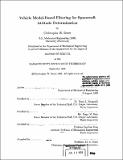Vehicle model-based filtering for spacecraft attitude determination
Author(s)
Dever, Christopher W. (Christopher Walden), 1972-
DownloadFull printable version (8.033Mb)
Advisor
Rami S. Mangoubi, Roger M. Hain and Zaichun Feng.
Terms of use
Metadata
Show full item recordAbstract
This thesis investigates the use of vehicle model-based filtering for spacecraft attitude determination. Whereas traditional navigation filters typically rely only on the kinematic relations between body rate and attitude in their filter designs, the state estimator presented here expands the plant model to include rigid body effects and disturbance torques. When rate sensing gyroscope measurement error components are large, as is anticipated in the new generation of micromechanical inertial sensors, the model-based approach provides superior performance to the standard kinematic designs. The estimation performance gains, which include enhanced attitude tracking of several tenths of a degree and closed-loop control stabilization, are most apparent when external attitude data becomes sparse. Even if the gyroscope measurement quality were to improve, for some satellite missions the possibility of an external measurement outage still necessitates vehicle dynamic modeling for greater gyro bias observability. The thesis also gives insight into robustness measures to compensate for model uncertainty, disturbance torque estimation, and GPS multipath error mitigation.
Description
Thesis (S.M.)--Massachusetts Institute of Technology, Dept. of Mechanical Engineering, 1998. Includes bibliographical references (p. 166-170) and index.
Date issued
1998Department
Massachusetts Institute of Technology. Department of Mechanical EngineeringPublisher
Massachusetts Institute of Technology
Keywords
Mechanical Engineering